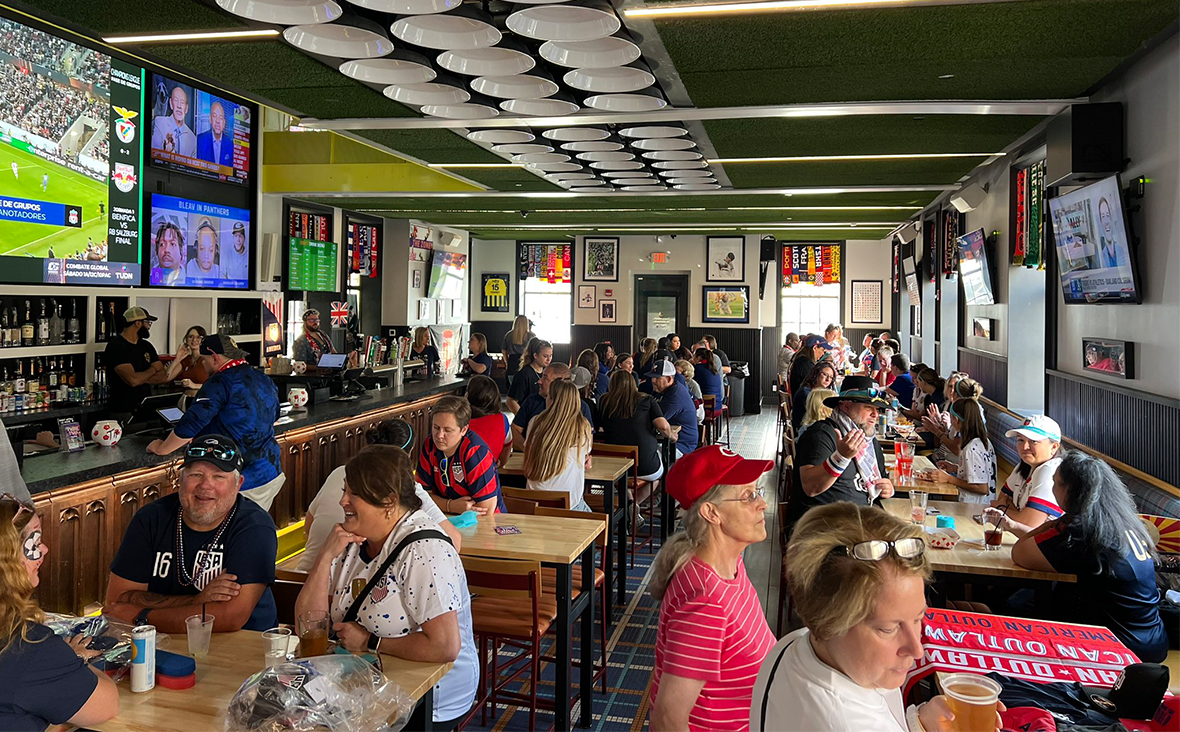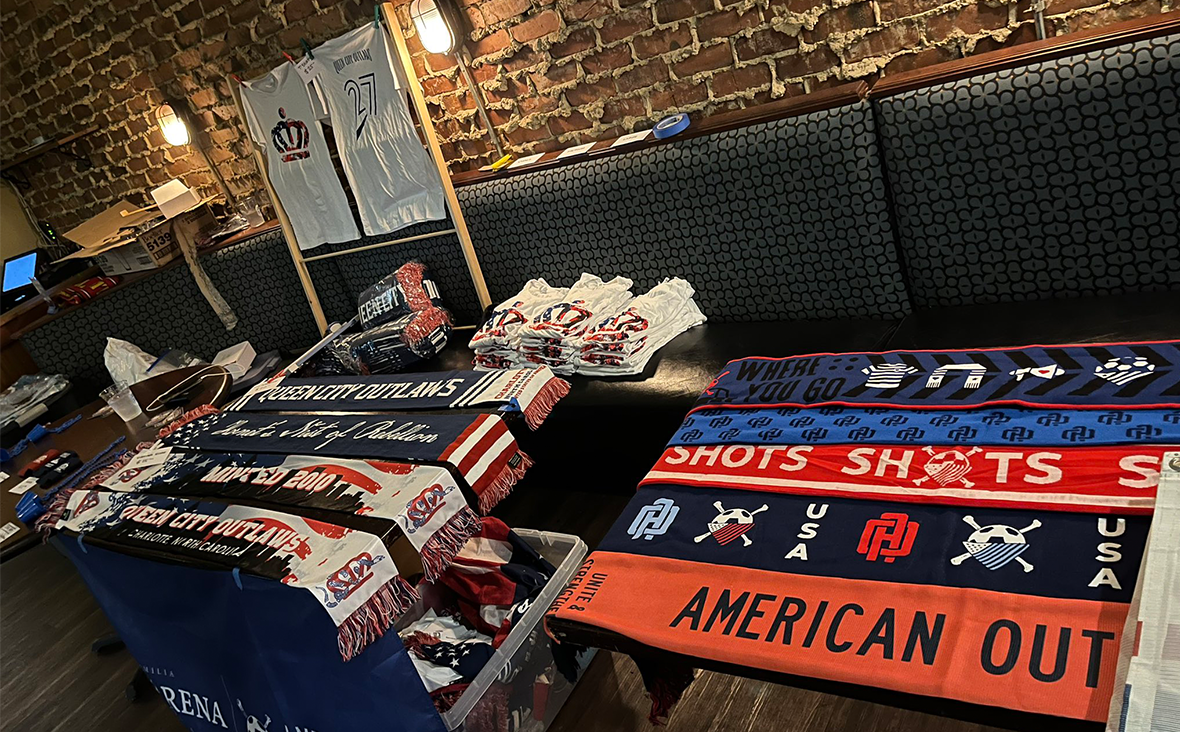How to change supporters’ groups' culture 101
How American Outlaws is changing supporters' football culture
Across the United States, one group of fans want to change the way soccer is supported in the country.
American Outlaws are a supporters group of the U.S men’s and women’s national teams with more than 23,000 members across more than 200 chapters in the United States and around the world.
In any group that big – and within a sport that has not traditionally been known for being inclusive – there comes certain challenges making sure spaces are safe and inclusive.
For American Outlaws that challenge was one they wanted to tackle proactively and head on: "How do we make that first impression as positive and welcoming one as possible?" asked Donald Wine, one of AO’s board directors and their Diversity, Equity, and Inclusion Chair.
The answer to that question came through their Common Goal membership (AO has been a member of Common Goal since July 2022) as AO decided to take the initiative and start of a process of DEI training with Common Goal.
“Some people felt we had been missing the mark on how to be more inclusive and that’s obviously paramount to the organisation,” Wine added.
"This is never going to be easy... But if you're able to handle the hard better next time, that may be the difference," he remarks. "This training will not eliminate these situations entirely, but if they do occur, we can go, this is something that we're prepared to handle."
The pursuit of education comes as part of the shared ambition to make the 2026 World Cup the most inclusive in history. And, for Wine, it was important that AO set an example of how soccer can become a truly inclusive space.
“We want to lead from the front,” he said. “If no one is stepping up to do this, then no one’s going to do it.”

During the training, chapter leaders came together to discuss topics such as diversity, equity, inclusion, identity, allyship, and anti-racism. And, the objective was to connect those ideals to the role of fans in shaping football culture. The sessions were action-based as each chapter leader, based on their understanding of the concepts, could think about how to incorporate these discussions in their chapter.
Pete Kalwei is the AO Kansas City chapter leader and one of the members who was part of the training sessions. Pete sees his role as a natural responsibility, as he is sure that, leader or not, he would be in that bar supporting his national team.
For him the national board should implement these learning sessions as a requirement for chapter leaders, it is a “no-brainer.” For Kalwei, the driving force is clear: "if somebody wants to be a fan of soccer, they should be able to easily and comfortably be a member of our group. Whatever that means to them if that's just showing up to a bar then they should feel comfortable doing it.”
But, of course, there are also challenges, mostly geographical because of the different contexts, the location of the bars, or the fact that the United States territory is very large. However, Donald Wine is sure that finding a “common ground” to share knowledge, resources, and exchange best practices is where the charm lies.
"There's all these different cities with different communities and the way they built them organically has to be different,” he said “So, the way that they approach it has to be different. That's where these stories could come in.”
Now there is a date marked on the calendar and the countdown has begun to prepare for the 2026 World Cup in the United States, Mexico and Canada, another challenge as big as it is exciting.
For this event it is especially important to be prepared, not only to welcome those who come from abroad but also to introduce the sport to those who are already there and not yet hooked. Donald makes it clear that lack of knowledge should not be a barrier.

"We used to have this movement where we would invite our friends to the bar, sit them down, get them a beer and they can ask any questions they want about the game from what is offside to like, why is Sophia Smith playing for the Portland Thorns and not for Washington Spirit?" he explained.
“The important thing is that when they leave, they take away the feeling that they have been welcomed, that they have a chance to get involved and to learn while having a great time.”
Last summer was an example of what AO is about. The last group stage match of the U.S. women's Team during the World Cup started at 4 a.m. in Kansas City, and from 3:30 a.m. there were already people waiting, says Pete Kalwei. "You know that no matter what, doesn't matter what time, doesn't matter what game we're going to be there," he added.
In a city with so many sports, for a bar that is not devoted to football to give them a dedicated space is to be very lucky. The bar where this AO chapter meets turned out to be one of the only places where they could watch their team at that time. It "ended up packed," and the World Cup became an opportunity to welcome new fans who don't regularly attend their gatherings.
Even though it's a long road, they are definitely giving a new shape to fan culture in football, and it's important for them to do it their own way. It is a relatively new sport compared to its English counterpart, and although they have adopted some things, there a few to change as well.
"So much of our soccer culture here, for better or worse, has kind of been caused by playing English supporters' culture. Why do we have scarves in Kansas City in 105-degree weather?" Pete jokes.

Donald is clear about this; they are using those blank pages to shape their fan culture. They are making their way of supporting their national team a tradition, something "organic and unique." The confidence to do so, he puts down to being willing to do trainings and have learnings like the recent one on DEI with Common Goal.
"We just have to have the confidence to say we don't need to rely on what they think is great, to know that what we have is great," he emphasises. "We don't have to mimic them on the field, and we don't have to mimic them in the stands either... We can make that our own," says Donald Wine.